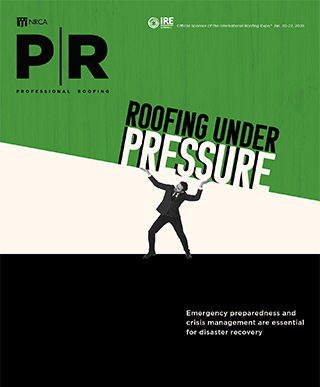In 1895, there were exactly two automobiles in Ohio, and they collided. Sometimes, collisions just seem to be inevitable.
However, other times, they can be avoided—but you'd never know it with some of the chatter going around the roofing industry in recent months. There's lingering suspicion in a lot of quarters—suspicion that the contractor community is out to get the manufacturing community, suspicion that the manufacturing community is out to avoid problem jobs, or suspicion that distributors are becoming too powerful and trying to dictate what products are used.
Ours is an industry composed of honorable people almost always trying to do the best thing for their customers. When we fall into a kind of finger-pointing trap, we all suffer.
Here, then, is a modest proposal in two parts. First, let's start with a clean slate, understanding, at the very least, the following: Contractors should expect the products they buy to perform as intended and meet applicable codes and standards; manufacturers should expect their contractor customers to install their products correctly, treat those products with care and respect, and report problems immediately when they occur; and distributors should expect their contractor customers to honor their orders, pay their bills in a timely manner and make reasonable demands for delivery of the products they buy.
And here's the second part of the modest proposal: Let's create an industrywide body that can review reports of problems or recurring issues to see whether we can find solutions without resorting to public disagreement or, worse, litigation.
This group doesn't need to have the formal structure required for arbitration and mediation in the traditional sense. Instead, it could be highly informal, structured initially to consider industrywide issues. Obviously, such a group would require a new level of trust and cooperation if it ever is expected to succeed.
And who knows? If we have success with a modest, informal dispute-resolution process, one day we can consider adopting what would really be beneficial—a mechanism for resolving individual, job-specific disputes before they get handed over to attorneys.
If those two cars in Ohio had brake lights, turn signals or good tires, perhaps that single collision could have been avoided. We've learned a lot in 110 years. Let's see if we can do better.
Bill Good is NRCA's executive vice president.
